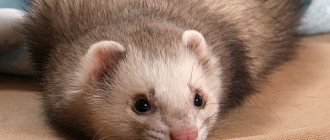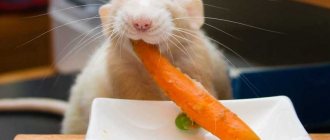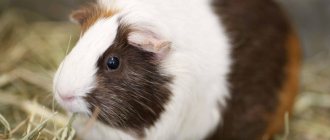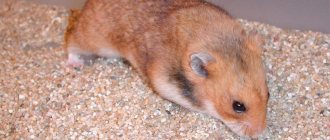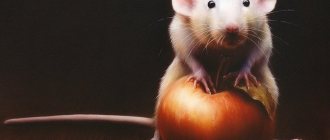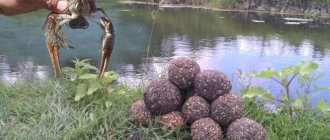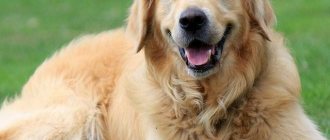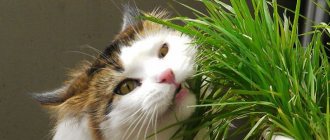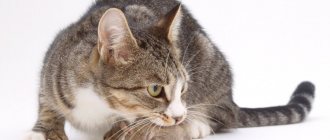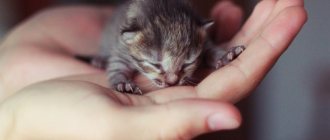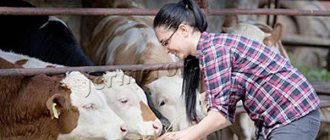Eating in the natural habitat
As a rule, wild ferrets choose burrows as a place to live. Because it is there that they can store food for themselves in sufficient quantities.
Ferrets' favorite foods are meat and eggs. Animals can easily get into the chicken coop and steal the bird from there. Even if a person has made every effort to protect his barn from ferrets, the small animals will still get creative and find a way to get to the food.
Sometimes ferrets eat worms, spiders, various beetles, caterpillars and even wounded animals. With their help, the body is saturated with protein.
Diet features
By nature, ferrets have developed the habit of storing food for future use. Therefore, when observing, you can notice how this nimble animal, instead of eating food, takes it and hides it in the most reliable place. This happens in natural conditions. But there is a need there, because the animal must make sure that there is something to eat during the cold season.
For domestic ferrets, there is no need to stock up, so it is better to give them food in small portions.
It is worth giving food 2 times a day, trying to choose the most correct foods. A ferret's diet should include:
- Grains – millet, oats, seeds, including watermelon.
- Fruits – preferably apples and pears.
- Vegetables - pumpkin, cucumbers, zucchini, tomatoes, bell peppers.
- Dairy products - kefir, always low-fat and without sugar, cottage cheese and natural yogurt.
- Chicken meat is boiled and always lean.
- Boiled fish, cooked without salt or spices.
- Boiled eggs – 2 times a week.
- Berries - currants, strawberries, cherries, cherries, gooseberries, blueberries.
- Insects and beetles, which can be purchased at a specialty store. It is not recommended to give ordinary earthworms, because the animal may become infected.
- Greens – leaves of vegetable crops, sprouts of grain plants.
During the winter season, you need to make sure that your pet receives a sufficient amount of vitamins. Ferrets enjoy eating dried fruits, peas and dried beans.
Ferret Nutrition Basics
Ferrets living in their natural environment mainly feed on animal food - mice, frogs, fish, chicks or eggs. The animal eats the prey whole, without separating the bones and fur. The grass and grain that was inside the victim are the only source of plant food for the wild animal.
Quail eggs are better for ferrets than chicken eggs
For a domestic ferret, such food will be a real delicacy, but not all owners have the opportunity to provide their pet with a regular supply of live food.
Although ferrets are domesticated animals, they should be fed as close as possible to what they would be fed in the wild. Under no circumstances should you feed the animal food from the owners’ table.
One of the main components vital for ferrets is taurine, which improves the functioning of the brain, heart muscle and liver. This amino acid is found in poultry meat.
Ideally, a ferret's diet should contain:
- Animal protein – 60%.
- Fats – 30%.
- Carbohydrates – 10%.
When creating a menu for your pet, you should take into account its age and time of year. It is also necessary to provide the ferry with the necessary substances during the rut, pregnancy and lactation.
Your pet's feeder should always be filled. Animals love to chew something throughout the day, so you shouldn’t feed them on a strict schedule.
It is better if the ferret eats 7 to 10 times a day in small portions.
The breeder decides what to feed the ferret at home based on his capabilities.
Greens suitable for feeding
Greens must be present in the daily diet. It contains many vitamins and microelements that play an important role in health.
Acceptable green feeds include the following:
- lettuce leaves;
- parsley;
- dill;
- basil;
- clover;
- calendula;
- chamomile;
- sage;
- lovage;
- young bamboo;
- fresh wheat sprouts or oats.
But there are also green foods that should never be given to ferrets:
- sorrel;
- mint;
- spices;
- grass
Special feed
In pet stores you can buy not only items for feeding ferrets. Nowadays, complete dry food enriched with vitamins and minerals is available for sale.
In order to choose the most suitable food for a particular pet, you can try giving it different types. As a result, it will be possible to determine the most preferable option among all feeds.
When purchasing dry food, you need to carefully study the packaging. It is necessary to completely eliminate any damage, since the food inside may be damp and no longer suitable for consumption.
The composition should not contain a large amount of sunflower seeds. They are high in calories, which is unsafe for health. But the presence of dry vegetables, fruits and grains in the food indicates its good quality.
Amount of feed consumed
If a person becomes the owner of a ferret, he must learn the basics of caring for the pet. It is important to remember that ferrets are nocturnal animals. All their activity occurs during the dark hours of the day. During the daytime they prefer to sleep. Therefore, they should be fed heavily in the evening and a little in the morning.
The amount of food that one animal needs at one time depends on its size, type, state of health, and activity.
Important! There is no need to give a lot of food in reserve. Anything that the ferret cannot eat will definitely be hidden in a secluded place.
It is important to ensure that your small pet’s supplies do not contain perishable foods. For example, cottage cheese, kefir and meat must be removed after 8 hours, otherwise the animal may be poisoned. It is necessary to check the supplies that the ferret has made, remove everything that is spoiled from there, replacing it with fresh ones. If the animal discovers that it is missing, it may become stressed.
If your pet eats ready-made dry food, then the daily nutritional intake can be found on the packaging. Typically, the daily feed intake is 2/3 of the pet’s body weight.
Nutritional norm
Of course, no matter what the ferret is, its feeding should be portioned. The serving size will depend on the weight, age, activity and health of the animal. For example, it is better to give a pregnant woman larger portions. Usually, reputable manufacturers indicate on the packaging what portions the pet needs, as well as what food is suitable for a small ferret.
Each animal is individual, so you need to carefully monitor its behavior, especially in the first days of feeding. You need to create a diet individually, since feeding is a very responsible process. This way you can easily understand whether your pet likes the food. It is also necessary to monitor whether your pet drinks after eating, because this is very important for the absorption of food. A good alternative to dry food is natural food, as mentioned above.
As for fish, your pet will happily eat flounder, mackerel, cod and trout. Boiled chicken eggs and raw quail eggs are also very useful. Occasionally you should give your ferret cheese and cottage cheese. A good addition to natural nutrition would be vitamins (especially in winter) purchased at a special pharmacy. At the same time, you should not engage in amateur activities. Before buying and giving your animal any vitamins, even the most harmless ones, it is important to consult a specialist.
At home, there is nothing better for a ferret than natural food; the pet eats such food with pleasure. Ferrets will not be able to constantly eat dry food. As in the wild, a natural diet and balanced feeding will be a real gift for the ferret. The best dish for a ferret is homemade minced meat, many recipes for which are available on the Internet. Here you can choose the recipe that your pet will like best. Calculating how much food your pet needs for a month is very easy to do.
Norm of products for preparing farshekashi for a month for one ferret
- 80 g flour or rolled oats;
- 225 g rabbit and 200 g beef meat;
- 142 g chicken hearts and 170 g beef heart;
- 145 g chicken gizzards;
- 125 g beef liver;
- 250 g turkey;
- 1.1 kg chicken necks;
- 250 ml water;
- 250 g low-fat cottage cheese;
- 60 g chicken skin and 251 g chicken fat.
How to feed a ferret? Of course, all of the above products require high-quality processing: they need to be thoroughly washed, film removed if it is beef, and bones if chicken and turkey are used. Next, operations similar to preparing stew with porridge are carried out. The meat is twisted through a meat grinder, the porridge is boiled, cottage cheese and a little water are added and everything is mixed. The result should be a homogeneous mass.
This food can be stored in portions, but it is best to prepare new food each time, since eating fresh is more pleasant and healthier. Also, to make minced meat more nutritious and healthy, you can and should add fish oil, milk powder, grated vegetables (in small quantities), and olive oil. All these supplements can be given only in minimal dosages, since the body may not digest large quantities, and the pet will feel unwell.
Recipe for every day
What to feed your ferret every day? To prepare a simple, but at the same time balanced diet, you will need the following list of products:
- 1 kg chicken;
- 100 g chicken hearts, heads, stomach and liver;
- 600 g of any porridge.
Next, perform the steps that are described in detail in the preparation of farshekashi. You also need to add yeast and cottage cheese here. This will be especially useful if your pet is a girl. All types of recipes can be found on various forums dedicated to ferrets, where you can chat with lovers of these animals and share your experiences, as well as watch photos and videos.
Recipe No. 3
Ferrets' diet should be varied, so to prepare such a dish you will need the following ingredients:
- 500 g chicken necks;
- 250 g chicken stomachs;
- 400 g of already boiled buckwheat or oatmeal, whichever is more to your pet’s taste.
There are certain rules for preparing farshekashi, recommendations on how to make the food healthy and not harm your pet. You also need to consider what ferrets eat. Farshekasha should be prepared only from fresh and natural products. The first and basic rule: all products must be fresh and of high quality. You should not cook too much minced meat or feed your pets only dry food. Your pet will enjoy eating fresh food, so you need to prepare according to the number of pets. You can add fish, but extremely rarely.
Fish should be given to your ferret once a month. There are two reasons for this. Firstly, the fish stunts the pet's growth. Secondly, there are significantly more worms living in fish than in any type of meat. It will be much healthier to buy fish oil at the pharmacy.
Of course, there are also completely prohibited foods that should never be given to your pet. These include vegetables and fruits. There is also a taboo on sweets and nuts. The pet cannot be fed from the common table. Too much flour can cause serious health problems. Also, you should not give moldy foods or food that has expired. Such products should be thrown into the trash immediately.
Drinking regime
In addition to food, like any other creature, a ferret needs water. A special container or drinking bowl should be provided for water, located close to the animal. Any diet requires constant drinking, especially if the ferret eats dry food. Pelleted food swells when it enters the stomach, and in this case, the ferret needs to drink as much water as possible.
A drinking bowl can be purchased at any pet store. Water should be in the drinking bowl at all times. It should be at room temperature and should not contain chemicals. If regular detergent enters the body, it can cause the death of a pet in the same way as dehydration.
Foods that should not be given to ferrets
To avoid problems and keep your pet healthy, you need to feed it correctly. There is a list of foods that need to be completely excluded from your pet’s diet:
- Spices.
- Potato.
- Spicy, salty, smoked and canned foods.
- Citrus.
- Onion and garlic.
- Mushrooms.
- Bread.
- Ready-made breakfast cereals.
- Pasta.
- Sweet.
- Dandelion leaves.
- Cereal leaves.
In order not to harm your pet, you should be careful about its nutrition. All of these products negatively affect the gastrointestinal tract and can cause poisoning.
Feeding the Cubs
Baby ferrets usually don't require much attention if their mother is okay. She is able to provide her offspring with everything they need, so there is no need to feed them additionally.
It’s another matter if the babies are left without a mother or she simply refuses to feed them. In this case, you will have to make a lot of effort to feed the babies artificially. To do this, you can use a pipette. Pet stores sell special food for newborn ferrets. These feeds need to be diluted to produce milk.
Small ferrets need to be fed every 2 hours. It is useful to massage babies' bellies to improve digestion. In addition to basic food, newborns, like adults, need water. It must certainly be warm, but not hot.
Starting from two weeks of age, boiled cereals, egg yolks, cottage cheese and greens can be introduced into the diet. You can also use meat puree.
A little later, if the body of small ferrets copes well with the food offered, you can transfer them to a nutritious diet. The only condition is that the food must be thoroughly crushed, for example, grated. But still, you shouldn’t suddenly stop feeding formula; babies will be stronger with it. They will also adapt more easily to a new diet.
Vitamins for pets
Ferrets' nutrition should be complete and balanced. If for any reason the animal lacks vitamins, for example, in winter, when there are no fresh herbs and vegetables, there is a need to saturate and support the small organism with special supplements.
In winter, you can give sprouted grains; they are rich in vitamins. If there are no grains, you should contact a veterinary pharmacy, where you can purchase special vitamin complexes. These can be powders, drops, tablets, granules.
Vitamins presented in the form of granules and rice balls do not have any therapeutic effect; they are used for prevention.
Minerals are also necessary for the normal functioning of the body. Most often, their deficiency is compensated for by adding meat and bone meal to food (about 2 times a week).
Farshekashi recipes
Have you got a pet ferret, but don’t know how to prepare food for him that will be both loved and healthy? Let's figure out what, besides dry food, you can feed your ferret at home. We offer a list of recipes for farshekashi, which, after cooking, will retain all the beneficial substances and microelements necessary for the normal functioning of your pet’s body. Of course, preparing such food requires time and effort, but the sight of a satisfied, fed animal will certainly please you and compensate for the inconvenience.
Recipe No. 1
Required ingredients:
- chicken necks - 2 kg;
- chicken stomachs - 1 kg;
- ready-made porridge (oatmeal or buckwheat) - 300-400 g.
The tripe and necks need to be ground, then mixed with porridge. Next, divide into portions and place in the freezer. Before feeding, the mixture must be thawed; you can use dietary supplements with vitamins. This minced meat is suitable for both adult members of the family and children.
Recipe No. 2
To prepare 1 kg of farshekashi, you will need (g):
- not very fatty fish - 150;
- boiled rice - 150;
- cottage cheese - 60;
- poultry meat - 480;
- poultry fat - 20;
- veal - 160;
- beef liver (50) can be replaced with beef heart (100) if desired;
- vitamin supplements.
Boil the meat with bones for several minutes, separate from the bone. Add rice to the broth and cook until done. Cut the fish, along with the head and bones, into large pieces, add the rest of the ingredients, mix, and pass through a meat grinder. Divide the resulting mixture into the required portions, corresponding in weight to the required amount for 1 dose and place in the freezer.
The serving for 1 dose is different for each animal. An adult male, for example, can eat from 200 to 400 grams of farshekashi, and a female can eat 2 times less. How much to feed your ferret depends on its appetite. The main thing is that the ferret is completely full after eating. To avoid chaos in the cage, leftover food should be removed.
Important! Under no circumstances should you make changes to these recipes yourself! This can lead to an imbalance of minerals and vitamins
Feeding rules
To keep your ferret healthy and in good spirits, you need to adhere to some feeding rules.
- Products (vegetables, fruits, meat, cottage cheese) that are offered to your pet must be fresh and free of rot.
- All seeds must be removed from the fruit to prevent the animal from choking.
- Remove food that has a short shelf life from the cage in a timely manner.
- Provide your pet with clean drinking water.
- You can give your pet fruits and vegetables only 2 days a week.
- It is necessary to give solid food because the animal must grind down its teeth.
- Eliminate salty and fatty foods from your diet.
- You need to get used to new foods gradually.
- Eliminate sour fruits from your diet.
- Exotic fruits should not be given.
- Do not overfeed your pet.
- Do not give your ferret food that is prepared for humans.
What do they eat in the wild?
Under natural conditions, ferrets feed on small rodents, lizards and frogs. The animal's diet also includes small birds, bird eggs and chicks. Forest ferrets eat worms and all kinds of insects with great pleasure.
Since ferrets are innate hunters who can quietly approach their prey, black grouse, hazel grouse and partridges have repeatedly become their prey.
A small part of its diet is occupied by fruits and fish.
In the warm season, the ferret often feeds on frogs, toads, young water rats and snakes, and sneaks into hare holes in search of small hares.
If he cannot find other food, he eats already dead animals.
The animal hunts only at night; it sleeps throughout the day.
Recommendations for hosts
To make it easier and more correct to keep a ferret at home, you should pay attention to some recommendations from experienced breeders and specialists in this field:
- If an animal develops diarrhea, you should give it rice porridge cooked in water. In ordinary life, rice is contraindicated precisely because of possible constipation.
- Among ferrets there are also picky people. You can buy dried crustaceans in stores especially for them. They are rich in protein, which is necessary for the life of a pet. In addition, small animals eat them with pleasure.
- A female expecting offspring needs clean water and healthy food more than others. The diet of pregnant females has its own peculiarities, the main one of which is the ban on apples. They should not be given to cubs under the age of 1.5 months.
- Old ferrets and very young ferrets should not be given too rough food due to age-related changes in the teeth. At an early age they have not yet become stronger, but in old age they have already worn out and lost their strength. Therefore, it is recommended to grind their food before feeding.
- Ferrets living at home retain many habits. One of them is storing food for future use. Therefore, the animal’s home needs to be arranged so that it can find a secluded place for its supplies. The main thing is not to forget to periodically check them and remove unfit for food products, replacing them with fresh ones.
- Ferrets may chew on something other than because they are hungry. These animals have a natural need to grind their teeth. To avoid overeating and damage to property, it is better to put a stick in the cage that the ferret can chew if desired. This can be a branch of an apple, pear, hazel, beech and other deciduous trees.
- If your ferret shows signs of obesity, you need to limit or completely eliminate all flour products (rolls, dryers, crackers) from his diet. You can set up a special labyrinth so that the animal can run and move more. If possible, the ferret should be allowed out of the cage to run around more often.
Having taken on the responsibility of keeping a ferret at home, a person must know how to feed it and what its nutritional requirements are. Often, due to inexperience and general ignorance, people feed animals incorrectly. This has a bad effect on their health and appearance. Therefore, before purchasing a pet, it is better to prepare in advance and consult with a specialist.
What to feed your ferret at home
The main rule when preparing a ferret’s diet is not to give him anything from your table.
Nutrition is a fundamental issue, since we are talking about the life and health of the animal. Improper nutrition causes significant harm to the ferret's body, causes serious illness and can cause premature death. Unlike other domestic animals, such as cats or dogs, ferrets are not at all adapted to human food .
By nature, these animals are predators, so their metabolism proceeds quickly. In four hours, the entire contents of the stomach are completely digested, although predators swallow their prey entirely, along with bones, entrails and fur.
List of the most useful products
It is very important that the ferret receives all the necessary vitamins, amino acids and minerals through food throughout the day. The most useful foods suitable for a predator's diet are:
- Meat;
Meat should be given every day with every meal. Poultry meat contains taurine, which is essential for animal health and cannot be obtained from other sources.
- Cereals;
Cereals are added to the ferret's diet in the form of heavily boiled porridge. Fiber, which is part of the porridge, has a beneficial effect on intestinal motility.
The share of plant foods should not exceed 15–30% of the total mass.
- "Live food"
Some ferret owners consider this type of feeding of their pets unacceptable. However, all veterinarians and experienced breeders agree that it is useful for a predator’s body to “hunt” live food in the form of small rodents or insects from time to time.
Ready-made feed
Owners prefer to treat ferrets with kitten food
Special foods come in the form of canned food or dry food. Despite the fact that today it is easy to find ready-made food specifically for ferrets on the shelves of pet stores, experienced breeders recommend treating predators with premium or super premium kitten food .
The fact is that ready-made food for ferrets can hardly be classified as economy class. In terms of their benefits, they are in many ways inferior to premium kitten foods.
If you prefer to give your ferret dry food, then the animal should always have fresh, cool water freely available.
If you have made a choice in their favor, you should completely abandon supplementary feeding in any form. For example, you cannot feed an animal dry food in the morning and offer it minced meat in the evening . It’s not for nothing that the finished product for feeding is called “balanced” - by mixing it with other food, you level out the entire balance of nutrients.
The following types of food are most popular among ferret owners:
- Eukanuba Kitten;
- Nutro Choice Kitten;
- Eagle Pack Kitten;
- Acana Kitten;
- Iams Kitten.
Cooking natural food
Farshekasha is a must-have dish in a ferret’s diet.
Natural food is home-made food, which should contain 70% meat products and 30% cereals. The most popular dish for everyday natural feeding of ferrets among the owners of these predators has become “farshekasha” .
The recipe for this dish is very simple:
From 4-5 types of cereals, porridge is cooked in water, without adding salt, spices, etc. The cereal should be boiled as much as possible, the consistency should become like dough. The finished porridge is mixed with minced meat products. In addition to the meat itself, skin, offal and offal must be added to the minced meat.
“Farshekash” is convenient to prepare in large quantities, divide into portions and store frozen. As needed, defrost the porridge in the refrigerator. Before feeding the ferret, the minced meat is warmed to room temperature.
Treats
You can also give 1-2 strawberries as a treat.
Perhaps every owner strives to pamper their pet with a treat from time to time. Treats help establish contact between humans and animals, and also act as the main tool for training a pet.
When choosing a treat for your ferret, it is important not to harm its health. The ideal option for a predator is dried and dried meat products.
It is also allowed to offer the animal as a treat:
- Boiled chicken or raw quail egg;
- A piece of fruit;
- Cornflakes;
- Store-bought treats for ferrets or cats.
Store-bought ones should not contain sugar, sweeteners, preservatives, legumes or nuts.
You can combine business with pleasure by using special vitamin pastes as a treat. But remember that vitamins can be added to your ferret’s diet only if he is on a home-fed diet, since the composition of ready-made food already contains a balance of essential substances.
Vitamins and supplements
As already noted, vitamins and supplements should only be included in a ferret’s diet if the animal is on a home-cooked diet. An overdose of any vitamin or microelement can harm your pet's health .
The choice of supplements and vitamin complexes for domesticated predators today is quite extensive. Here are the most popular ones:
- "Vita-Sol";
This comprehensive vitamin supplement contains 7 vitamins and 4 types of fatty amino acids. The manufacturer recommends using the supplement during periods of growing up, pregnancy and lactation, as well as during molting of the animal. Directions for use and doses are indicated on the packaging. The duration of the course is 1 month.
- "FerretVite";
FerretVite paste will help your pet gain weight and improve appetite
This is a special balanced paste that contains minerals, vitamins and easily digestible fats. This product is designed to support ferrets during postoperative periods, and also helps sick and exhausted animals recover. Eating paste increases the animal's appetite and weight gain, so it is not recommended to give treats to overweight pets. The feeding schedule is indicated on the packaging.
- Vitamins of groups A, D and E.
Vitamins of these groups are given mainly to females during periods of estrus, pregnancy and lactation, as well as one-month-old ferrets in order to prevent bone diseases. The dosage should be observed very strictly, adhering to the factory instructions or the veterinarian's prescriptions.
Ferrets are strictly prohibited from taking vitamins intended for humans. Taking such drugs causes illness and death in pets.
